 |
 |
 |
 |
| |
||||
What's Wrong With My Baby?A CBS 2 News Special Assignment  Their unborn baby was genetically tested and found to be perfectly healthy, but it was actually born with a deadly disease. Their unborn baby was genetically tested and found to be perfectly healthy, but it was actually born with a deadly disease. Now the parents are accusing genetic labs of skipping tests and keeping secrets. CBS 2 News' Drew Griffin explores prenatal testing of babies that's supposed to warn parent about possible birth defects, and shows us what happens when doctors don't tell you all they know about what's wrong with your baby. Special Assignment: What's Wrong With My Baby? Aired Thursday, September 17, 1998 at 11 p.m. The process is called amniosynthesis, reports CBS 2 News' Drew Griffin. It's the most common form of genetic screening for pregnant women. It's in laboratories like Genyzme Lab in Orange, Calif., that scientists and technicians get their first peek at the earth's next inhabitants, said Griffin. To be an expectant couple like Cheryl Dawson and Anthony Sarabia, getting a report back from this lab saying your baby is doing just fine can be a huge relief. "It said that within the limits of current technology there were no problems, and of course we were elated," said Sarabia. But Genzyme couldn't have been further from the truth, said Griffin. "There was a neonatologist, and as soon as the baby was born she said this baby has major problems," said Dawson. The baby was born with Prader Willi Syndrome, an extremely rare disease that affects muscle tone, motor abilities and expresses itself in an insatiable appetite. According to Griffin, it was devastating news for Dawson and Sarabia and their healthy daughter Leilani. "There was nothing I wanted more than to bring him home, but we had to think of him and how he was going to be best in the longer term and we found a person who was able to provide for him in a way that we didn't think we could," said Dawson. But what has troubled this couple more than the agony of having to give up a very sick baby, is what they found out later. "We ultimately got a copy of a Genzyme form, and on that form it listed the test which would have detected Prader Willi Syndrome," said Sarabia. "Standard of care genetics is to do the usual chromosome analysis and then to go beyond that when there is some particular indication," Denzyme Medical Director Dr. Stirling Puck told CBS 2 News. Puck said in the case of Cheryl Dawson, there was no indication that anything was wrong. There was no family history or ethnic history that would indicate the child she carried had a birth defect. The only was to find that specific birth defect, according to Genzyme, would have been to test Dawson for every possible disorder known to genetics. University of California, Los Angeles geneticist Dr. Wayne Grody agreed. "There are about 10,000 known genetic diseases and new ones are being reported every week," said Dr. Grody. Dr. Grody said even though tests are available to cover a wide variety of rare birth defects, it is simply impractical -- even impossible -- to offer every test to every pregnant woman unless there's a reason for it. "You get into the issue of which ones do we talk about," Dr. Grody told Griffin. "You can't talk about all 10,000. That would be a four-year medical school course and even physicians don't know all of them available." The couple has sued Genzyme asking that the company now disclose all the tests it has available, and let parents decide which tests they want done, reported Griffin. Their efforts, they say, could save another couple from going through the agony they've suffered. "We have this technology available, why shouldn't parents have this information," Dawson said. That sharing of information is really all Dawson and Sarabia are after. They want every expectant couple to know there are tests beyond what's currently offered that can detect all sorts of genetic disorders.
|
|
 |
|
 |
||
|
12 p.m.
Woman 2 Woman Holiday Decorating Tips 5 p.m. 6 p.m. 11 p.m.
|
||
 |
||
|
4-5 p.m.
Judge Judy Judy Justice! 8 p.m. 9 p.m. 10 p.m.
|
||
| |
||
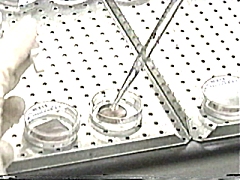 The dishes are only about the size of a quarter, but in each one are the hopes and dreams of a new life. What exists in the fluid is the fingerprint of a baby -- human cells taken from their mothers, separated, cultured and incubated.
The dishes are only about the size of a quarter, but in each one are the hopes and dreams of a new life. What exists in the fluid is the fingerprint of a baby -- human cells taken from their mothers, separated, cultured and incubated.  What this couple found out on Sept. 27, 1996 should have put their worries at ease. Genzyme told them their baby was a boy, and within the limits of current technology he was doing fine.
What this couple found out on Sept. 27, 1996 should have put their worries at ease. Genzyme told them their baby was a boy, and within the limits of current technology he was doing fine. 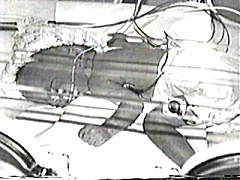 In the weeks following their child's birth, this family had to make the toughest decision of their life: to care for the baby or give it away.
In the weeks following their child's birth, this family had to make the toughest decision of their life: to care for the baby or give it away. 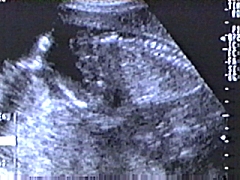 What this couple learned was Genzyme could have told them about their baby, said Griffin. The lab could have told them about the rare disorder, but didn't because the test, known as FISH, does not fall into what is commonly known as normal standard of care.
What this couple learned was Genzyme could have told them about their baby, said Griffin. The lab could have told them about the rare disorder, but didn't because the test, known as FISH, does not fall into what is commonly known as normal standard of care. 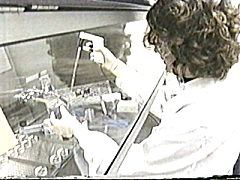 "Nobody practices genetics by offering every test there is to a pregnant woman. There's too many tests," Dr. Puck told Griffin.
"Nobody practices genetics by offering every test there is to a pregnant woman. There's too many tests," Dr. Puck told Griffin. 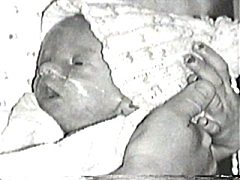 But Dawson and Sarabia think that answer smacks of big brotherism. They believe the medical field withheld information that could have told them what was wrong with their child.
But Dawson and Sarabia think that answer smacks of big brotherism. They believe the medical field withheld information that could have told them what was wrong with their child. 

